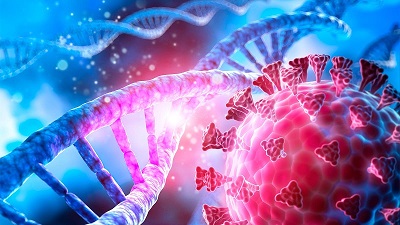BREAKING! Icahn School of Medicine Study Shows Those With Long COVID-19 Symptoms Typically Have Altered Gene Expressions Due To SARS-CoV-2!
Source: Long COVID Research Oct 07, 2021 4 years, 3 months, 4 weeks, 6 hours, 23 minutes ago
Long COVID Research: A new study by researchers from Icahn School of Medicine at Mount Sinai-New York shows that gene expression changes during acute SARS-CoV-2 infection may decide long-COVID symptoms.

Physicians and medical experts around the world are finally coming to terms that after 21 months into the COVID-19 pandemic, the post-acute sequelae of COVID-19 disease (PASC) or what are commonly termed as long COVID, are compounding the global health crisis.
These sequelae often debilitating, are clinically heterogeneous and of unknown molecular etiology.
This new study involved detailed transcriptome-wide investigation of this new condition in a large cohort of acutely infected patients followed clinically into the post-acute period.
The study findings revealed that gene expression signatures of post-acute sequelae were already present in whole blood during the acute phase of infection, with both innate and adaptive immune cells involved. Plasma cells stood out as driving at least two distinct clusters of sequelae, one largely dependent on circulating antibodies against the SARS-CoV-2 spike protein and the other antibody-independent. Altogether, multiple etiologies of post-acute sequelae were found concomitant with SARS-CoV-2 infection, directly linking the emergence of these sequelae with the host response to the SARS-Cov-2 virus.
The study findings were published on a preprint server and are currently being peer reviewed.
https://www.medrxiv.org/content/10.1101/2021.10.04.21264434v1
The study findings revealed the changes in gene expression profiles associated with long-term consequences of the COVID-19. As observed in the study, the genetic signature of post-acute COVID-19 (long COVID) can be detected in innate and adaptive immune cells already during the acute phase of SARS-CoV-2 infection.
The long-lasting clinical presentation of COVID-19 called long COVID or PASC, is characterized by a wide range of symptoms that appear in about 37% of COVID-19 patients after recovery.
It has been found that the most common symptoms of long COVID include generalized fatigue, headache, joint/muscle pain, breathing difficulty, sleep disturbance, and loss of smell or taste.
Though long COVID symptoms have been observed in 40% of hospitalized patients, some recent evidence has shown that people with asymptomatic or mildly symptomatic SARS-CoV-2 infections are more susceptible to develop long-lasting consequences.
To date it has been found that host immune responses to acute SARS-CoV-2 infection are associated with long-lasting COVID-19 consequences.
For this
Long COVID Research, the study team analyzed whole-blood gene expressions and antibody levels in a large group of hospitalized COVID-19 patients who had subsequently developed long COVID symptoms.
The research was conducted on 495 hospitalized COVID-19 patients and 72 healthy and hospitalized controls.
After six months of discharge, 251 patients were followed up to examine the appearance o
f long COVID symptoms.
The detailed analysis of patient-provided reports revealed two distinct clusters of post-COVID consequences related to pulmonary and neuropsychiatric symptoms.
It was noted that no significant correlation was observed between disease severity and appearance of long COVID.
Numerous blood samples were collected from 180 of 251 followed up patients to perform RNA sequencing. The analysis identified significant associations of higher plasma cell level and lower follicular helper T cell level with long COVID pneumonia and muscle pain.
The detailed analysis of differentially expressed genes in whole blood revealed no significant association with any symptoms.
Alarmingly however, many symptom-related differential expression signatures were observed in specific cell types. Specifically, plasma cells exhibited the highest number of gene signatures related to various symptoms, including sleep disturbance, pulmonary complications, nausea/vomiting/diarrhea, skin rash, loss of smell or taste, and pneumonia.
Most significantly, a complete downregulation of pneumonia-associated genes was observed in patients. Among other tested cell types, significant associations of gamma-delta and CD8+ T cells, CD4+ memory resting T cells and neutrophils, and CD4+ memory activated T cells with worse quality of life, teeth problems, and memory problems were observed, respectively.
The study team conducted two differential expression tests to identify the group of genes that were differentially expressed in both tests and were associated with the same symptoms (same-direction differentially-expressed genes). Similarly, a different group of genes was identified that showed differential expressions in both tests but with opposing symptoms (opposite-direction differentially-expressed genes).
Interestingly in plasma cells, the comparison of symptoms pairwise for the number of same-direction differentially-expressed genes identified two distinct symptom clusters.
The two clusters were named "pulmonary cluster" (lung problems and pneumonia) and "miscellaneous cluster" (sleep disturbance, nausea/vomiting/diarrhea, skin rash, and loss of smell or taste).
Importantly in the pulmonary cluster, a downregulated expression of genes associated with antibody production and function was observed. In contrast, upregulated expressions of the same genes were observed in the miscellaneous cluster.
A further separate set of experiments were conducted to assess whether host response to anti-spike antibodies can influence the symptom-specific differential expression of genes in plasma cells.
This detailed analysis revealed a significant correlation between antibody response and genes associated with most miscellaneous cluster symptoms except skin rash and loss of smell/taste. In contrast, no such correlation was observed for genes associated with lung problems and pneumonia.
The study findings importantly reveal that host response to acute SARS-CoV-2 infection is directly associated with the appearance of long COVID symptoms. The study identifies two distinct sets of long COVID symptoms - one mostly depends on the blood levels of anti-spike antibodies, and the other is antibody-independent.
But most significantly, the study highlights the significance of acute-phase gene expression signatures in plasma cells in inducing long COVID symptoms.
For the latest on
Long COVID-19 Research, keep on logging to Thailand Medical News.
